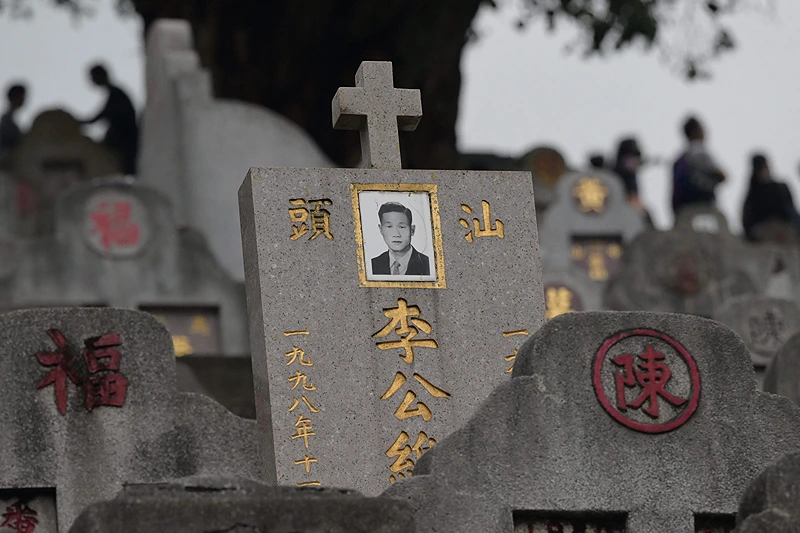
OAN’s Brooke Mallory
4:16 PM – Sunday, May 21, 2023
Chinese developers have now created “griefbots,” which are chat programs that represent the personalities and recollections of the deceased, using a combination of cutting-edge artificial intelligence (AI) technologies in an effort to re-connect with their loved ones.
A 29-year-old Chinese software engineer based in Hangzhou named Yu Jialin wrote an essay describing the use of computer programs to match lip movements to speech recordings in lip-syncing technology.
His grandfather, who passed away more than ten years ago, came to mind as he read the piece.
“Can I see Grandpa again using this technology?” Yu Jialin asked.
His quest to recreate his grandfather is one of countless instances of Chinese tech-enthusiasts utilizing AI to bring the dead back to life. Yu had the ability to “say his goodbyes to his grandfather” through the application.
Yu stated that he was just 17 years old when his grandfather passed away, in an interview with investigative journalist Tang Yucheng. He was reportedly on the edge of realizing the outcomes of his extremely personal, unauthorized AI research after weeks of hard work, late nights, and countless difficult challenges.
“Hey, Grandpa. Guess who I am?” Yu asked the program. The AI version of his “Grandpa” delivered a generic response.
“Who you are is not important at all. Life is a beautiful miracle,” the bot wrote back, according to Tang.
“In today’s technology, you don’t need too many samples for an AI to learn the style of a person,” said Haibing Lu, an information and analytics professor at Santa Clara University.
According to Lu, whose research focuses on AI and systems like ChatGPT, the well-known text-based program that accurately mimics human voice and thought patterns, have already figured out how most people naturally speak or write. Yu obtained a collection of old letters from his grandmother in order to teach the AI model about his grandfather.
“You only need to tweak the systems a little bit in order to loosely get a 99% similarity to your person. The stark differences will be minimal,” Lu said.
According to Sue Morris, director of bereavement services at the Dana-Farber Cancer Institute, it’s normal for people to adapt how they grieve as technology advances more and more. Psychologists frequently use the technique of having mourning clients envision their deceased loved one sitting in an empty chair next to them.
“It feels as though these griefbots are the technological step up from that,” Morris said.
However, she continued by saying that griefbots significantly reduce the user’s level of control. Many grievers manage their emotions by deciding when and how to process them. According to Morris, a sudden trigger, such as an inappropriately timed chatbot message, can frequently cause someone to experience even more overwhelming grief.
“Maybe 98% of the time, the program is going to say the appropriate thing, but what if it doesn’t for a small percentage? Could that then send somebody into more of a downward spiral?” she asked.
Mary Frances O’Connor, the director of the Grief, Loss, and Social Stress Lab at the University of Arizona, told the press that even if griefbots seem insulting to some, history demonstrates that social conventions around the deceased are subject to ongoing change.
The popularity of generative AI has increased in China, along with reports of new griefbots. Wu Wuliu, a 24-year-old Shanghai blogger who goes by the moniker Wu, went viral on social media in March when he revealed that he had programmed a chatbot to imitate his deceased grandma.
Similar to Yu’s grandfather’s bot, Wu’s bot only offered a few responses.
“But I feel good being able to look at Grandma and talk more with her,” Wu said.
A Chinese cemetery had also employed voice cloning AI and GPT software to reproduce people who were being buried at its facilities during this year’s Tomb Sweeping Festival, reported by the Chinese media group, YiCai. According to the cemetery spokesperson, thousands of people have used its platform, and it costs about $7,300 to reconstruct a deceased person.
However, Lu, a professor of information analytics, said that the griefbot and its byproducts may present difficult moral choices. A scammer or fraudster may find it simple to use a deceased person’s identity to their advantage. They could send that person’s data to an AI and then have someone pose as a psychic who converses with the dead’s spirit.
“In a future where everyone knows about this technology, maybe you can sign a document that says your descendants can use your knowledge, or to forbid it,” Lu suggested.
An American firm called HereAfter.AI also provides an opt-in experience for users to submit their own personalities online. An AI machine creates a digital avatar for each person that can communicate with their friends and family after they pass away after learning about them through uploaded images, audio logs, and questionnaires.
Stay informed! Receive breaking news blasts directly to your inbox for free. Subscribe here. https://www.oann.com/alerts

